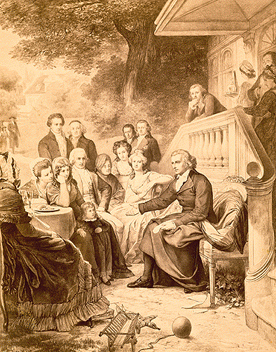|
Never, methinks, are the gods
known to visit,
Never alone.
Hardly comes Bacchus, the merry,
beguiling,
But arrives Cupid then, boyish and
smiling,
Phoebus, the lordly one, makes
himself known.
They come, they approach, the
divinities all,
They fill and fulfill the
terrestrial hall.
Tell me, how should a mere worldling regale you,
Chorus divine?
Grant your renowned immortality to me,
Gods! What can mortals then give to you, truly?
Lift me unto your Olympus on high!
This joy, it dwells only in Jupiter's palace;
O fill it with nectar, O pass me the chalice!
Pass him the chalice! Grant this the poet,
Hebe, alone!
Moisten his eyes with a heavenly dew,
Keep the detestable Styx from his view,
Let him thus seem to be one of our own.
It rushes, it sparkles, the fount of delight,
The bosom grows peaceful, the eye becomes bright.
|
![]()

![]()
![]()